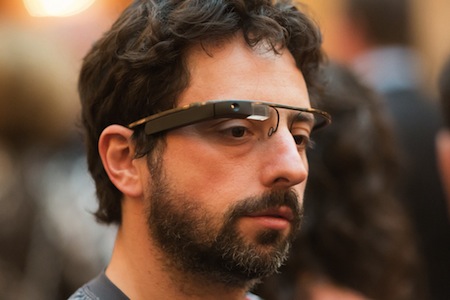Science Fiction
Dictionary
A B C D E F G H I J K L M N O P Q R S T U V W X Y Z
Google's Project Glass May Augment Your Reality

Google has apparently allowed some prototypes of its Project Glass augmented reality glasses out in public for testing. Google co-founder Sergey Brin wore the glasses at Dinner in the Dark, a Benefit for the Foundation Fighting Blindness in San Francisco.
Technovelgy readers may recall the earlier article Google Glasses With Heads Up Display Coming Soon?, which reported early comments that they resembled Oakley Thump glasses. However, a more slender look is shown below.
One person who had used the glasses said: “They let technology get out of your way. If I want to take a picture I don’t have to reach into my pocket and take out my phone; I just press a button at the top of the glasses and that’s it.”

(Sergey Brin wears Google's AR glasses[Thomas Hawk])
A group of us from Google[x] started Project Glass to build this kind of technology, one that helps you explore and share your world, putting you back in the moment. We’re sharing this information now because we want to start a conversation and learn from your valuable input. So we took a few design photos to show what this technology could look like and created a video to demonstrate what it might enable you to do.
Blogger Robert Scoble tweeted that "Sergey wouldn’t let me wear the Google Glasses but I could see they were flashing info to him" and added that Brin said that the glasses were many months from being a consumer product.
An idealized view of the near future of this technology is presented in this Google Project Glass video.
(Google Project Glass video)
For the science-fictional view point, see the overlay specs from Charles Stross' 2007 novel Halting State or the videoshades from Bruce Sterling's 1988 novel Islands in the Net.
From Project Glass on Google+, NYTimes and Washington Post; thanks to Winchell Chung for the tip on this story.
Scroll down for more stories in the same category. (Story submitted 4/4/2012)
Follow this kind of news @Technovelgy.| Email | RSS | Blog It | Stumble | del.icio.us | Digg | Reddit |
Would
you like to contribute a story tip?
It's easy:
Get the URL of the story, and the related sf author, and add
it here.
Comment/Join discussion ( 1 )
Related News Stories - (" Display ")
iPhone Air Fulfils Jobs' Promise From 2007 - A Giant Screen!
'... oblongs were all over the floor and surfaces.' - Kazuo Ishiguro, 2021.
Transparent 4K OLED Wireless TV From LG
You will note that HG Wells also figured out the aspect ratio of the future!
DOTPad Braille Device Offers Live Access
Amazing tactile display.
Transparent MicroLED Screen From Samsung
Has Samsung nailed the Look of Things To Come?
Technovelgy (that's tech-novel-gee!) is devoted to the creative science inventions and ideas of sf authors. Look for the Invention Category that interests you, the Glossary, the Invention Timeline, or see what's New.
Science Fiction
Timeline
1600-1899
1900-1939
1940's 1950's
1960's 1970's
1980's 1990's
2000's 2010's
Current News
The New Habitable Zones Include Asimov's Ribbon Worlds
'...there's a narrow belt where the climate is moderate.'
Can One Robot Do Many Tasks?
'... with the Master-operator all you have to do is push one! A remarkable achievement!'
Atlas Robot Makes Uncomfortable Movements
'Not like me. A T-1000, advanced prototype. A mimetic poly-alloy. Liquid metal.'
Boring Company Drills Asimov's Single Vehicle Tunnels
'It was riddled with holes that were the mouths of tunnels.'
Humanoid Robots Tickle The Ivories
'The massive feet working the pedals, arms and hands flashing and glinting...'
A Remarkable Coincidence
'There is a philosophical problem of some difficulty here...'
Cortex 1 - Today A Warehouse, Tomorrow A Calculator Planet
'There were cubic miles of it, and it glistened like a silvery Christmas tree...'
Perching Ambush Drones
'On the chest of drawers something was perched.'
Leader-Follower Autonomous Vehicle Technology
'Jason had been guiding the caravan of cars as usual...'
Golf Ball Test Robot Wears Them Out
"The robot solemnly hit a ball against the wall, picked it up and teed it, hit it again, over and again...'
Boring Company Vegas Loop Like Asimov Said
'There was a wall ahead... It was riddled with holes that were the mouths of tunnels.'
Rigid Metallic Clothing From Science Fiction To You
'...support the interior human structure against Jupiter’s pull.'
Is The Seattle Ultrasonics C-200 A Heinlein Vibroblade?
'It ain't a vibroblade. It's steel. Messy.'
Roborock Saros Z70 Is A Robot Vacuum With An Arm
'Anything larger than a BB shot it picked up and placed in a tray...'
A Beautiful Visualization Of Compact Food
'The German chemists have discovered how to supply the needed elements in compact, undiluted form...'
Bone-Building Drug Evenity Approved
'Compounds devised by the biochemists for the rapid building of bone...'
